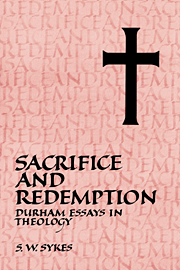Book contents
- Frontmatter
- Contents
- List of contributors
- Prefatory note
- Introduction
- PART I
- PART II
- PART III
- 11 The conscious and the unconscious sacrifice: Kierkegaard on art, suffering and religion
- 12 Pearse's sacrifice: Christ and Cuchulain crucified and risen in the Easter Rising, 1916
- 13 The concept of sacrifice in Anglican social ethics
- 14 Eucharistic sacrifice: the problem of how to use a liturgical metaphor, with special reference to Simone Weil
- PART IV
- Index of biblical and ancient references
- Index of persons
12 - Pearse's sacrifice: Christ and Cuchulain crucified and risen in the Easter Rising, 1916
Published online by Cambridge University Press: 10 March 2010
- Frontmatter
- Contents
- List of contributors
- Prefatory note
- Introduction
- PART I
- PART II
- PART III
- 11 The conscious and the unconscious sacrifice: Kierkegaard on art, suffering and religion
- 12 Pearse's sacrifice: Christ and Cuchulain crucified and risen in the Easter Rising, 1916
- 13 The concept of sacrifice in Anglican social ethics
- 14 Eucharistic sacrifice: the problem of how to use a liturgical metaphor, with special reference to Simone Weil
- PART IV
- Index of biblical and ancient references
- Index of persons
Summary
The idea of sacrifice occurs in Christian cultures in realms remote from high theology, and the invocation of the soldier's sacrifice in war became highly topical in 1982, when even sensitive Anglican bishops defended the British onslaught in the Falklands with the text ‘Greater love hath no man than this, that a man lay down his life for his friends.’ The pacifist might reply that the scripture does not say that a man should kill for his friends; yet it needed only this little war to remind us of the power of sacrifice even in modern language, in the ambiguous willingness to give up one's own life while taking the lives of others. It was this understanding of sacrifice in war, while invoking the model of the passion of Christ, which inspired and justified the first ultimately successful ‘anti-colonial’ revolution of the twentieth century, the Irish Rising of Easter 1916; and the speeches and poetry of the leaders of the Rising, of Joseph Mary Plunkett and Thomas MacDonagh, and more especially of Padraic Pearse, drew upon the sacrificial Christ of a prayerful Irish Catholicism.
The Easter reference in the Rising has always attracted attention. As James Stephens declared at the time, on Easter Sunday in Dublin they cried ‘Christ has risen’ in the churches; they cried ‘Ireland has risen’ on Easter Monday (A. Martin 1966,38). ‘Elsewhere Easter is celebrated as the Feast of the Resurrection’, remarks Terence de Vere White; ‘In Dublin it is celebrated as the Feast of the Insurrection’ (O'Brien 1973, 308).
- Type
- Chapter
- Information
- Sacrifice and RedemptionDurham Essays in Theology, pp. 218 - 234Publisher: Cambridge University PressPrint publication year: 1991
- 1
- Cited by



